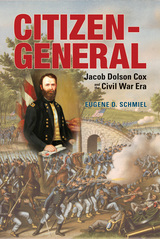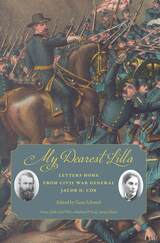2 books about 1828-1900

Citizen-General
Jacob Dolson Cox and the Civil War Era
Eugene D. Schmiel
Ohio University Press, 2014
A History Book Club Reading Selection
The wrenching events of the Civil War transformed not only the United States but also the men unexpectedly called on to lead their fellow citizens in this first modern example of total war. Jacob Dolson Cox, a former divinity student with no formal military training, was among those who rose to the challenge. In a conflict in which “political generals” often proved less than competent, Cox, the consummate citizen general, emerged as one of the best commanders in the Union army.
During his school days at Oberlin College, no one could have predicted that the intellectual, reserved, and bookish Cox possessed what he called in his writings the “military aptitude” to lead men effectively in war. His military career included helping secure West Virginia for the Union; jointly commanding the left wing of the Union army at the critical Battle of Antietam; breaking the Confederate supply line and thereby precipitating the fall of Atlanta; and holding the defensive line at the Battle of Franklin, a Union victory that effectively ended the Confederate threat in the West.
At a time when there were few professional schools other than West Point, the self-made man was the standard for success; true to that mode, Cox fashioned himself into a Renaissance man. In each of his vocations and avocations—general, governor, cabinet secretary, university president, law school dean, railroad president, historian, and scientist—he was recognized as a leader. Cox’s greatest fame, however, came to him as the foremost participant historian of the Civil War. His accounts of the conflict are to this day cited by serious scholars and serve as a foundation for the interpretation of many aspects of the war.
The wrenching events of the Civil War transformed not only the United States but also the men unexpectedly called on to lead their fellow citizens in this first modern example of total war. Jacob Dolson Cox, a former divinity student with no formal military training, was among those who rose to the challenge. In a conflict in which “political generals” often proved less than competent, Cox, the consummate citizen general, emerged as one of the best commanders in the Union army.
During his school days at Oberlin College, no one could have predicted that the intellectual, reserved, and bookish Cox possessed what he called in his writings the “military aptitude” to lead men effectively in war. His military career included helping secure West Virginia for the Union; jointly commanding the left wing of the Union army at the critical Battle of Antietam; breaking the Confederate supply line and thereby precipitating the fall of Atlanta; and holding the defensive line at the Battle of Franklin, a Union victory that effectively ended the Confederate threat in the West.
At a time when there were few professional schools other than West Point, the self-made man was the standard for success; true to that mode, Cox fashioned himself into a Renaissance man. In each of his vocations and avocations—general, governor, cabinet secretary, university president, law school dean, railroad president, historian, and scientist—he was recognized as a leader. Cox’s greatest fame, however, came to him as the foremost participant historian of the Civil War. His accounts of the conflict are to this day cited by serious scholars and serve as a foundation for the interpretation of many aspects of the war.
[more]

My Dearest Lilla
Letters Home from Civil War General Jacob D. Cox
Gene Schmiel
University of Tennessee Press, 2023
Jacob D. Cox experienced more facets of the Civil War than most officers: by land and sea, in both Western and Eastern Theaters, among the inner political circles of Ohio and Washington, DC, in territories hostile and friendly, amidst legal conflicts both civilian and military, and in the last campaigns in Tennessee and North Carolina. The Union general capitalized on his experience by penning his two-volume Military Reminiscences of the Civil War, one of the war’s finest memoirs and arguably the best by a nonprofessional soldier, as well as Atlanta and The Battle of Franklin, both definitive studies for nearly a century. In 2012, Gene Schmiel, Cox’s biographer, learned of a cache in the Oberlin College archives of 213 letters Cox wrote to his wife, Helen, during the war. Schmiel recognized these documents as a ready resource for Cox as he wrote his histories, and many stand as first drafts of Cox’s analyses of the military and sociopolitical events of the day.
Helen Finney Cox (her husband affectionately referred to her as “Lilla”) was a mother of six and the daughter of Oberlin College president Charles Finney. These intimate and insightful wartime letters show both the fondness Cox had for his spouse and his respect for her as an intellectual equal. To Helen, the stoic, introverted statesman revealed—as he did to no one else—his inner thoughts and concerns, presenting observant, lucid, and informative reports and analyses of the war, his changing life, and his ambitions. This collection illustrates the life of a Gilded Age Renaissance man as he made the transition from untested soldier to respected general and statesman.
Helen Finney Cox (her husband affectionately referred to her as “Lilla”) was a mother of six and the daughter of Oberlin College president Charles Finney. These intimate and insightful wartime letters show both the fondness Cox had for his spouse and his respect for her as an intellectual equal. To Helen, the stoic, introverted statesman revealed—as he did to no one else—his inner thoughts and concerns, presenting observant, lucid, and informative reports and analyses of the war, his changing life, and his ambitions. This collection illustrates the life of a Gilded Age Renaissance man as he made the transition from untested soldier to respected general and statesman.
[more]
READERS
Browse our collection.
PUBLISHERS
See BiblioVault's publisher services.
STUDENT SERVICES
Files for college accessibility offices.
UChicago Accessibility Resources
home | accessibility | search | about | contact us
BiblioVault ® 2001 - 2024
The University of Chicago Press









